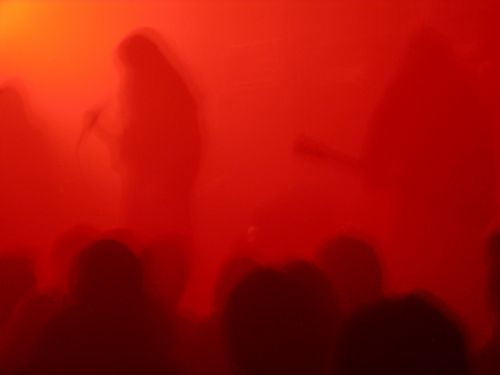March 30, 2007
Don't Miss...
Networks and Assemblages: The Rebirth of Things
in Latour and DeLanda
Friday 20 April
5.00-7.00pm, Ben Pimlott Lecture Theatre
With Graham Harman | American University in Cairo
Graham Harman is Assistant Professor of Philosophy at the American University in Cairo. He supported himself through part of graduate school as a Chicago sportswriter, in which capacity he interviewed figures such as Sammy Sosa and Bobby Knight. He is the author of Tool-Being: Heidegger and the Metaphysics of Objects, Guerilla Metaphysics: Phenomenology and the Carpentry of Things, and Heidegger Explained: From Phenomenon to Thing, as well as translator of Gudrun Kramer's History of Palestine.
In recent years, Manuel DeLanda has been one of the more imaginative defenders of realism in philosophy. In his latest book, A New Philosophy of Society (2006), DeLanda portrays a world of alliances and alloys in which things are nonetheless not defined by their interactions with other things. This brings DeLanda into tacit agreement and enmity with Bruno Latour, who also pictures a world of autonomous actors partially linked in networks. Although their models of reality are strikingly similar, and though both authors contribute to a badly needed revival of metaphysics in the continental tradition, they disagree on the key point of how a thing is defined by its relations within the world. This talk aims to clarify the silent dispute between Latour and DeLanda, which deserves to be a central controversy of the emerging object-philosophy.
Speculative Realism
Friday 27 April
1.00-7.00pm, Ben Pimlott Lecture Theatre
A one-day workshop co-sponsored by COLLAPSE
Chaired by Alberto Toscano | Sociology, Goldsmiths
Participants:
Ray Brassier | Middlesex University
Iain Hamilton Grant| UWE (University of West England)
Graham Harman | American University in Cairo
Quentin Meillassoux | Ecole Normale Superieure
(Papers available online here)
Attendance is free but please register beforehand by emailing Alberto Toscano at a.toscano@gold.ac.uk
Contemporary continental philosophy often prides itself on having overcome the age-old metaphysical battles between realism and dualism. Subject-object dualism has supposedly been destroyed by the critique of representation and supplanted by a fundamental correlation between thought and world. This workshop will bring together four philosophers whose work questions some of the basic tenets of this continental orthodoxy. Speculative realism is not a doctrine but the umbrella term for a variety of research programmes committed to upholding the autonomy of reality against the depredations of anthropocentrism, whether in the name of transcendental physicalism, object-oriented philosophy, or abstract materialism.
March 28, 2007
March 26, 2007
Apologies for lack of substantive activity of late, I've a couple of deadlines to meet... back later this week...
March 25, 2007

Bethan Cole, who also has a new blog, on Ghost Box, Mordant Music and Junior Boys versus 'the bizarrely raveless new rave and the dubious charms of an unending production line of derivative indie guitar bands' in The Sunday Times today.
Meanwhile, if you want to imagine what the buildings of Belbury Poly might look like, you could do worse than peruse this fabulous set of photographs (via Sit Down, Man) - one example above...
Also check out Ben Noys on Ballard and Baudrillard over at the always-excellent Ballardian
March 23, 2007
Upcoming
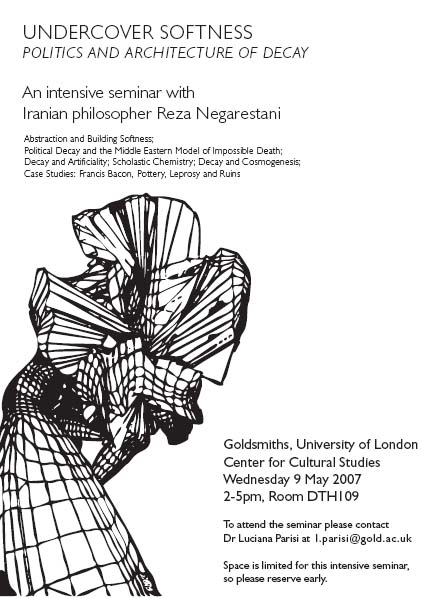
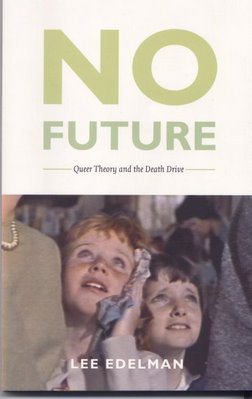
No Future event at King's College, London
No Future Together
A one-day symposium on Lee Edelman’s No Future: Queer Theory and the Death Drive.
Further details via IT
March 19, 2007
Traps and cats

There's nothing very surprising in Adam Curtis' The Trap: What happened to our dreams of Freedom, compelling as it is. Judging by the second episode (I missed the first one last week), The Trap might as well be called A Brief History of Neo-Liberalism. Using his trademark oneiric style, Curtis shows how the spread of reductive models of human motivation from the Cold War into economics, education and science led to the occlusion of politics. This week, Curtis concentrated on New Labour, demonstrating how the Blairites' fixation on targets and quantification of the unquantifiable led not to increased efficiency of public services, but what I have called 'market stalinism'. Curtis' detailing of the way in which harrassed managers 'game the system' - cutting waiting times in casualty by employing nurses whose only job was to say 'hello' to patients, or re-classifying trolleys as beds - made for a bitter comedy, whose punchline is the fact that social mobility has actually declined under a Labour government.
Ironically, as Bat complained in his review, The Trap performs its own occlusion of politics. 'There is no sense of any kind of alternative vision, nor any pointers to a solution. Episodes such as the rise of Margaret Thatcher just "happen", with the immense political conflicts of that period relegated to a footnote. Rather than seeing ideas as being consciously promoted by particular social forces, Curtis paints a world where we all just sleepwalk into oblivion.'
What that is left out of The Trap - struggles, contestation, alternatives - is covered in Marker's A Grin Without a Cat, which Kino Fist will be showing next week. I wrote the following about A Grin Without a Cat last year:
- The revolutions were cultural; which is to say, they understood that culture and politics could not be conceived in isolation from one another. Both Althusser and the situationist-inspired students of 68, in many ways so opposed, could agree on at least one thing: that cultural products were never merely cultural. In their condemnations of recuperated Spectacle and Ideological Apparatuses, they granted a weight to cultural products which few would countenance now.
... 'which few would countenance now'... An observation that, sadly, is confirmed by the comments thread on this post of Daniel's, where the idea that 'entertainment' could have any political implication is considered so self-evidently ridiculous that anyone holding it must be 'sexually inadequate'. This, mind you, is in relation to 300, a film described by Ahmad Sadri as follows:
- Nobody expects historical accuracy from a Hollywood movie based on a graphic novel. But using domestic racial and sexual stereotypes to demonize the enemy is breaking new ground. In the movie 300 Persian “immortal” knights are snarling beasts beneath their sinister masks and their king is a pierced and bejeweled androgynous savage. But, more significantly, Snyder’s Persians – I am not talking about the disposable extras covered up to their eyes in male burqas – are predominantly black and by implication of mannerism and affect, homosexual. Allowing the widest berth for the genre and medium one still marvels at Snyder’s audacity in demonizing the “Asiatic hordes” while morphing the Spartan warrior into the typical white American survivalist. Snyder’s Spartans are white guys fighting a sea of racially inferior blacks, yellows and browns. They are staunchly heterosexual and weary of their elected elders (ephors) who are seen as sacrilegious lepers, traitors and scheming politicians.
If it is regarded as an absurd stretch to find political meaning in a film like this, what hope is there? This, assuredly, is the militantly complacent view from inside the entertainment-opiated Trap.
The accusations of 'sexual inadequacy' are particularly telling. Perhaps we need to reverse this; it is not that political awareness is a symptom of sexual inadequacy, but quietism that is a symptom of hedonic satiation.
March 16, 2007
... magical and unreal, and yet necessary...
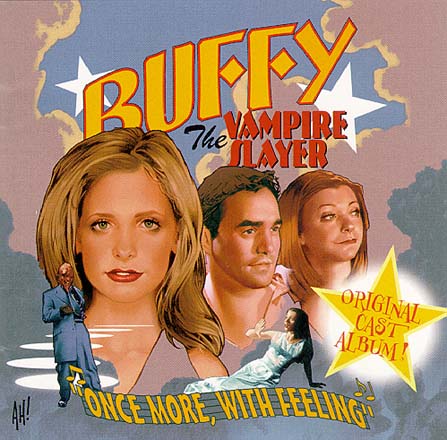
Further to my remarks on the musical in my post on Brecht, Matthew Moore writes:
- In the musical episode of Buffy, "Once More With Feeling", the characters are only honest with each other when they are possessed by the Spirit of The Musical. By Song. Whilst this might sound like a trad version of Singing Voice = Unmediated Truth it doesn't play out that way. The unveiling of feeling through song is not positive - there is no Singing Cure - but leaves the characters more lost, bitter & confused than at the beginning. The Song here is literarally something demonic & unnatural - and destructive (if you sing & dance for too long, you spontaneously combust). This happens in Season 6 of Buffy - which is all about becoming an adult with the compromises & decisions that entails. Song is something unpleasantly Grown-Up, something that forces you to both say & hear you do not want to. Which is a nice reply to the accusation that Musicals are infantile.
I confess that I haven't seen 'Once More with Feeling', but this sounds very much like Pennies from Heaven and The Singing Detective, where the truth of the characters' feelings and fantasies emerges in Song. Yet this truth cannot appear in its own right, but only as an interruption of the ordinary rules and conventions of realism (one way, perhaps, in which truth must appear in the guise of fiction). That was what fascinated me about Brecht's take on songs - that, in the Musical, their role was to produce an ontological rupture, a break in realism's entrancing imitation of life.
Pennies from Heaven is of course about the power of songs, and perhaps Arthur's tragic fate is sealed once he seeks to make the two worlds - the world of everyday reality and the 'world that the songs are about' - co-incide.
In Edith's Diary (which may well be her masterpiece), Highsmith produces a vivid description of music's power to disrupt everyday life. Edith is a talented writer who has sacrificed her career to take on the roles of wife, mother (of a slacker misfit) and carer (to her husband's helpless geriatric uncle). She uses music as a means of keeping the urgencies of everyday life - the relentless, Sysiphian 'household flow' of domestic tasks - briefly at bay.
- Edith put some Brahms waltzes (Opus 39) on the record player, and closed the living room door which went into the hall ... She had lit a cigarette, and was relaxing in an armchair. The piano music delighted her, transported her to a world of beauty and brilliance - with a beginning and an end. It was odd to feel for a few seconds at a time - the sensation came and went - completely like the music, quite at home with it, familiar with every note, yet to realize that the music was not her home, was not the main part of her life. Sometimes, she thought music that she especially liked was a drug for her, magical and unreal, and yet necessary.
Unreal, and yet for many seconds the inspired waltzes made her love her house more, made her remember that the house and the semi-rural life she had now was after all what she had wanted for years. ...
When the first side of the record was finished, the silence began to attack Edith like a live thing, eating away at her brief contentment. This was life, she thought, back to the ironing which she now did in the kitchen, back to thinking of where next she might send the article on recognising Red China. A vague depression crept through her, crepuscular, paralysing.
Notice the way that the word 'home' functions in two different ways: when Edith is 'at home' with the music she is momentarily transported out of her 'home' ('the music was not her home'). Yet the narcotic effects of the music, which are uncanny, 'unhomely', cast for a while an enchanting glow on her domestic space, suspend the constant reproaches and dissatisfactions that her home, with its uncompleted and uncompletable myriad of tasks, customarily brings. Music is in excess of life, but it is also that which makes life possible ('magical and unreal, and yet necessary'). Silence, meanwhile, is life - within a sentence, Highsmith moves from seeing silence as a 'living thing', voracious and predatory, to seeing it as life itself ('this was life').

Edith's style of listening is somewhat old-fashioned. As I argue in the current issue of Fact, it is well-known that the discipline and drama of listening to an LP is anachronistic in postmodern conditions of 'total flow'. The turntable is an antique object, the practice of turning a record over a lost ritual, arcane and archaic. (In club culture, it goes without saying, turntables remain central, but their role here is precisely to render records as part of a flow, not as a series of discrete objects.)
Edith's foreground listening is a relic. More common now is the way that Edith's son, Cliffie - a character who, to modern eyes, cries out to be diagnosed as autistic - uses music. Cliffie habitually plays a transistor radio in his bedroom, less because he wants to commune with the music, and more because he wants to mark a boundary, ward off others. This use of music - as a means of defence and of withdrawal - is facilitated by the Walkman and later the iPod, which further enable the integration of music and everyday life. Yet this at the cost of the heightened, magical, transformative power which Edith experiences in music - because that power depends upon music being used as an interruption of the quotidian. Instead of enhancing everyday life, music has increasingly become part of everyday life, consumed and compromised by its banality.
Anahid Kassabian (via blah-feme) talks of an era of 'ubiquitous listening'. Kassabian reports that, '[m]any of my students (and my daughter’s baby-sitters) leave the radio or MTV on in different rooms, so that they are never without music. They say it fills the house, makes the emptiness less frightening.' Music's ubiquity extends far beyond music programming, evidently; pop is now an omnipresent background in soap operas, documentaries and advertisements alike (at the moment, Razorlight are a particular favourite on British TV, and it is practically impossible to watch television for any length of time without being confronted with their dull meat and potatoes indie grind.) Music, deprived of any 'scene', any special context or staging, is fully integrated into what Baudrillard called 'the ecstasy of communication'. Must we then speak, as blah-feme suggests, of an 'end of music'? Not because music has disappeared, but because, on the contrary, it is impossible to avoid.
March 14, 2007
Recommended
Rufige Kru - Malice in Wonderland (Metalheadz). A strangely out-of-time set, like a lost album from 1995 but actually recorded in the last year with Goldie's latest collaborator, Heist. While Goldie's output under his own name has been variable at best, everything he has produced under the Rufige Kru moniker has been pristine. Malice in Wonderland is compulsive; listening to it like returning to a drug you were once hooked on and wondering why you ever gave it up.
Sunn0))) and Boris - Altar. From October last year, this makes the best case I've yet heard for dronecore as the return of post-rock. The album's anomalous centrepiece, 'Sinking Belle (Blue Sheep)', featuring the vocals of Jesse Sykes, is an eerie, echo-drenched submarine-deep downer that sounds like some cross between Seefeel, Insides and Portishead.
If Sunn0))) are metal, it is liquid metal; the physical states that they recall are those in which a solid begins to liquify, or a liquid begins to solidify - the slow flow of glacial ice or cooling lava. Fittingly, then, the first track on Altar is called 'Etna', the last 'Blood Swamp', the latter's title perfectly capturing the sound's clotted viscosity. But the track puts one in mind more of ice fields than fetid swamps: with all the elegiac tense poise of Morricone's Once Upon a Time in America, 'Blood Swamp' could be a soundtrack for the melting of the polar ice-caps. You can practically feel the massive ice sheets slowly cracking beneath your feet, the crevices beginning to open up...
March 09, 2007
'My death is everywhere, my death dreams'

Baudrillard's contribution can be most easily appreciated when you consider who condemned him and why. He was denounced by Brit-American empiricists as an incomprehensible obscurantist at the same time as he was dismissed by the overlords of Continental Philosophy for being a pop philosopher, flimsy and insubstantial. Behind these denunciations, you gain a glimpse of a theorist who was playful yet solemn, an opaquely lucid stylist who was in love with jargon and in touch with media.
Baudrillard was never quite laborious or detached enough to qualify as a Continentalist, nor even as a philosopher (he was based, improbably, in a Sociology department). Always an outsider, projected out of the peasantry into the elite academic class, he ensured his marginalization with the marvellously provocative Forget Foucault, which wittily targeted Deleuze and Guattari's micropolitics as much as it insouciantly announced the redundancy of Focault's vast edifice.
In Baudrillard, theory escaped the 60s. Baudrillard's texts, in their disappointed tone as much as anything else, belong to our world, our era. The various revolutions of the sixties were petering out as Baudrillard began to produce his work. The system proved to be voracious, protean; it absorbed the attacks of its would-be enemies and sold them back as advertising. Critique was useless; new - fatal - strategies needed to be developed, which involved the theorist homeopathically introjecting elements of the system, the code, in the hope of setting the system against itself, overbalancing it.
It is a commonplace that science fiction reveals more about the time it was written than it tells us about the future. But Baudrillard's self-styled science-fiction-theory - which drew upon the theoretical fictions of Ballard and Dick - actually did foretell the future, which is our present. Already, in the 1970s, Baudrillard was basing theoretical riffs on reality TV and the media logic of terrorism. His texts, which dispensed with the academic machinery of footnotes and references around the time of Symbolic Exchange and Death in 1977, became increasingly incantatory and aberrantly lyrical until they resembled a glacial cybernetic poetry, which, especially in the later works, you could easily believe was the work of some dejected AI, endlessly remixing its own concepts and linguistic formulas.
Baudrillard is condemned, sometimes lionised, as the melancholic observer of a departed reality. He was certainly melancholic, but what he mourned was not a lost reality but what he variously termed the illusory, symbolic exchange, the seductive. Reality disappeared at the same moment that art and artifice were eliminated. Deprived of its heightened reflection, extension and hyperbolization in myth, art and ritual, reality cannot sustain itself. It is the very quest to access reality in itself, without illusion, that generates the hyperreal implosion. Here, as Baudrillard long ago realised, reality TV is exemplary. Film an unscripted scene and you might not have art, but you do not have reality either. You have reality's uncanny double, its excrescence: simulation, precisely.
Baudrillard: the prophet in our desert, the prophet of our desert.
'The irreversibility of biological death, its objective fact and character, is a modern fact of science. Every other culture says that death begins before death, and that life continues after life, and that it is impossible to distinguish life from death. Against the representation which sees in one the term of the other, we must see try to see the indeterminacy of life and death, and the impossibility of their autonomy in the symbolic order.'
- Symbolic Exchange and Death
See also: Antigram and Sit down man...
Misuc in our mess-age
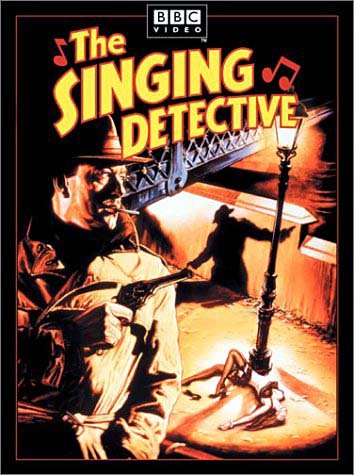 | 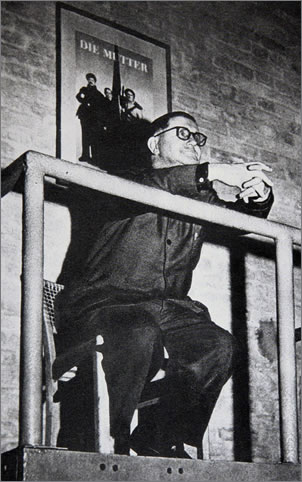 |
A few weeks ago, after I had written about Robbie as a paragon of PoMo, Daniel posed a question to me: weren't the features I was ascribing to Williams - distanciation, irony, acting 'as if' he were a pop star - exactly those of the Brechtian alienation effect?
The answer to Daniel's question is provided by Owen in the course of a tremendous post on the Brechtian 'Verfremdungseffekt'.
- Soon before he died, Brecht spoke of how ‘all that remains of the Verfremdungseffekten is the ‘effects’, stripped of their social application, stripped of their point.’ While the theatre might totally disdain it in favour of realism, you can find this all over the 21st century cultural-political landscape: a kind of cynical Brechtian where the alienation effect’s insistence on the stepping in and out of roles is a way of avoiding ever actually saying anything, of ever committing ... This version of Brechtian technique is never truly dissonant or disjunctive, and is able to exist only because of the absence of two important components of the Epic Theatre’s Apparatus. First, the absence of the democratisation of the apparatuses, and second the absence of the political, educational project.
Williams' battery of stage tricks is one of many examples of the way in which postmodernism has recuperated the alienation effect. Robbie's reflexive tics function, not to lay bare the structures beneath and behind performance, but to draw attention to his loftily transcendent ego, which is always positioned above and outside performance. By contrast with 'Brecht’s works', which are 'absolutely full of singing, dancing, rhythm, laugh-out-loud jokes, wickedly biting irony, and perhaps most importantly, a refusal to ever be boring', there's always been a joylessness, a refusal to give in Williams' cheeky chappy song-and-dance routines.
One interesting - and, on the face of it, surprising - component of Brecht's theory is in fact the role it ascribes to music (or what Brecht, to differentiate his use of songs and sound from the 'ceremonial' use of music in the classical concert hall, called 'misuc'). We're accustomed to regard music as a mystifying force, beguiling, rhapsodic, anti-reason. Yet Brecht thought that music should play the role of interrupting somnambulent immersion:
- ‘Music had the task of protecting the audience from a state of ‘trance’. It did not serve the enhancement of existing or anticipated effects but rather interrupted or manipulated them. So if there were songs in a play, it was not as if the story ‘dissolved into song’. The people in the play did not break into song. On the contrary, they openly interrupted the story. They assumed a pose for singing and presented the song in a way that did not fully correspond to the situation.’
The Musical emerges as a fundamentally avant-garde form, profoundly anti-naturalistic. Songs are able to shake us from our trance not by virtue of any inherent properties of music itself, but because they cannot be made ontologically consistent with realism. Songs erupt into the diegesis, dissipating its spell.
Owen's invocation of Dennis Potter here is surely entirely apt. Pennies from Heaven and The Singing Detective operated as a pulp modernist reclaiming of the reflexive techniques postmodernism had appropriated and tamed. Potter demonstrated that reflexivity need not function either as narcissistic indulgence or as a bar to enjoyment; and that works which exemplified the Verfremdungseffekten could be extremely popular without being populist.

The same goes for Public Enemy, also cited in Owen's piece. Using the Bomb Squad's shock tactics, PE explicitly aimed to use sound to 'wake us up', to shake their audience from media trance: 'too many people are sleeping while standing up'. We're no longer supposed to mention PE (too 'rockist'), but they functioned for those of us of a certain age much like The Clash supposedly operated for a previous generation, as politicisers and mythographers, uniting sonic intensity and experimentalism with didactism in a way that Strummer and co could only dream of.
Unlike rock, which inherits Romanticism's will-to-trance, rap has always been meta-textual, eternally vigilant, pathologically awake to the point of insomnia. Hip hop continually draws the audience's attention to the different ontological levels at play in the 'text': the rapper's boasts reminding us that a performance is happening, the surface noise of the record itself becoming incorporated into the track, the disjunctures and incongruities of the samples functioning as a literal 'making strange' of musical history. Yet the once shocking alienation effects produced by hip hop have long since been naturalised, with rap now established as both an entertainment genre and a form of 'realism'.
Owen sets Brecht up against Beckett (or at least the middle-brow version of Beckett, which casts him as the lone, tortured artist). In terms of fiction, Beckett's anti-type might well be Burroughs, who, as Daniel pointed out in his Kino-Brecht essay (not yet online) was a follower of Brecht. Even though he greatly admired Beckett - an admiration that was not reciprocated - Burroughs himself saw Beckett as his opposite. 'Beckett is journeying inwards, I am journeying outwards', Burroughs said. There was much more to their differences than that - but perhaps what they had in common was a refusal of realism; Beckett gradually paring representation back, producing texts that were something like the equivalent of abstract paintings, Burroughs going in the direction of fragmentation, citation and collage.
All of which puts an interesting perspective on what Carl is calling 'the New Solemnity'. Perhaps the reason that japesterish irony and po-faced belief can so easily resemble one another is that they are not opposites so much as flip sides of the same coin. I say this as much as a reproach - and reminder - to myself as anything else.
I suppose I first confronted this conflict of aesthetic visions when I tried to reconcile listening to The Fall with listening to Joy Division as a teenager. It wasn't only Joy Division's solemnity which The Fall were implicitly antipathic towards; it was the very seamlessness of Joy Division's aesthetic which The Fall - with their rap-like reflexive self-awareness, their parodies, their continual breaking of frame, blew apart. Joy Division made good on the promise of Romanticism, dwelling in a dark night of Dionysus denuded of all revelry and reduced to the pure lust for abolition. What entranced was their psychological realism, their metaphysics of presence, the illusion of telepathic contact with another's mind. The Fall rejected Romanticism absolutely. Yet, at their best, like Potter and PE, they showed that seriousness need not entail religiose solemnity, that enjoyment and thinking could be mutually intensifying rather than mutually exclusive, that de-naturalisation would not have to be concomitant with de-libidinization.
The profound relevance of Brecht, then, as a reminder, in fact, that 'enjoyment' is intertwined with 'making strange'. Here - and mindful of Simon's recent exasperation at popism's eternal sunshine of the spotless mind - it is worth re-asserting the distinction between pleasure (a return to previous satisfactions, according to Freud) and an enjoyment that lies beyond the pleasure principle.
Interestingly, a while back Fire in the Mind actually asked 'whether K-punk is in any way still capable of truly enjoying music'. 'Eventually,' he goes on, 'I always start doubting those meticulously constructed theories, because I suspect the words were there almost at the same time as the aesthetic experience itself.' This assumes an opposition between thinking/ writing and 'aesthetic experience' which cries out for deconstruction - using 'deconstruction' very technically to mean an unsettling of the metaphysics of presence. Fire in the Mind is by no means a popist, as far as I can tell, yet what he appears to share with popism is a privileging - I would say a mystifying - of the category of 'aesthetic experience', whose alleged purity is to be set against the corrupting mediations of language/ writing.
Simon argues that it is impossible to write about 'a record entirely in terms of its pleasurability. I guarantee by the middle of the second paragraph you’ll be reaching for some kind of measure of significance or relevance.' I would go further: it is impossible to take any pleasure from music if you focus entirely on its hedonic qualities alone. Leaving aside the Lacanian wisdom that enjoyment is only possible if there are impediments to it, the popist aim to 'eliminate all obstacles to pleasure' makes hedonism a kind of monastic discipline which, taken to its logical extreme, would require that we encounter pop as abstract quanta of pleasure-inducing stimuli, devoid of all associations and cognitive content. (Here popism has an affinity with the Deleuzian quest to encounter raw intensities.) The imperative that we make ourselves a tabula rasa, an empty self open to all and any pleasure, actually ends up as a form of ascetism, as demanding and austere as any Kantian call for disinterestedness.
Insofar as there is an 'aesthetic experience' - and I suppose the lesson I was trying to draw from Brechtianism was that we ought to be very suspicious of that category - it seems to me indissolubly bound up with cognition and reflection. Writing about pop is not some grim duty, grave and heavy, which distances you from enjoyment. On the contrary, writing and thinking are a continuation of the enjoyment of the 'music itself'. When I write about pop, I do not only seek to represent some pre-existing enjoyment; I seek to intensify and extend the enjoyment that I take from listening. It is an auto-erotic process, which more often than not makes me enjoy the 'experience' of a record more when I return to it. In this way, the enjoyment of the music is not confined to the times when one is actually listening to it; the images, thoughts and affects which the music throws up linger long after the record has stopped playing.
March 08, 2007
March 07, 2007
I promise I'll write something of my own soon, but now Marcus Scott (whom I never would have suspected was a devotee of this sort of thing) enters the fray, with some errata and addenda:
- Dylan Carlson didn't give Kurt Cobain the gun he shot himself with, it's an urban myth, but the other thing is Kurt was actually in Earth for a while, there is like one song available which is getting re-released as a single soon, it's on the album extra capsular extraction along with the live peformance they did at disobey which russell haswell released on his or records label.
[Sebastian]'s also wrong about pentastar in the style of demons, one track on there is absolutely bizarre time-stand-still business.
Got to remember too, earth 2, which is kind of the ur lp for a certain type of doom was out on uber grunge label sub-pop, not a metal label, so to an extent it's the messy misery of grunge taken to extremes, the guitar sound on earth 2 isn't as punishing or heavy as the guitars on the sunn drone tracks or something like boris when they've done drone. I reckon it chimes in a timely way with what koner etc were all up to.
Southern lord is a metal label too, O'malley himself was a journalist for the black metal scene etc who did a magazine called descent, he knows his shit obviously, a lot of the other bands on the label are metal proper. Incidentally do you know about Probot, a heavy metal supergroup, who released on southern lord, featuring members of (black metal originals) venom, lemmy from motorhead, lee dorian from cathedral etc... all singing over tracks written by - erm David Grohl from Nirvana/Foo fighters, so in a way this stuff's roots are the splits between grunge and metal, grunge being one of the last times I think guitar music had much to say in terms of a popular music form.
March 05, 2007
Jon Wozencroft on Sunn0))) (highly relevant to Carl's remarks on the New Solemnity - about which I hope to say something in a day or two - and the affinities between metal and Dead Can Dance, NWW, Nocturnal Emissions, Current 93):
- It's odd to see all your Sunn musing online, we (i.e. Touch) have had quite a connection with them over the past 2 or 3 years because of Oren Ambarchi's collaborations with them, and previously we released an Earth LP on the OR imprint that Russell Haswell does with us. There's one musician who's done some very prescient work vis-a-vis their sound, David Jackman who records as 'Organum', loads of obscure records on labels like Die Stadt, and collaborations with Current 93/Nurse With Wound... One record, "A Missing Sense" is really great, don't know whether it's been issued on CD or not.
And Joe from A Mess of Help begs to differ with Sebastian about Earth: 'Pentasonic is not an Earth album, while Pentastar: In The Style Of Demons is, and far from being "rote stoner-rock" it's actually one of Earth's weirdest albums...'
March 02, 2007
Sunn0))) talk about Earth and the robes (link courtesy Matthew Jones)
Meanwhile, Sebastian Roberts provides more of the Earth backstory:
- Earth have changed a LOT over the past decade.
Following the release of "Earth 2", Dylan Carson was left standing as the band's sole member. While working on the third album by himself, his close friend & former collaborator Kurt Cobain killed himself - with the shotgun that Carson had given him as a present. Needless to say, Carson was thoroughly rattled. He gave one more half-hearted attempt at playing music (the rote stoner-rock "Pentasonic", '96) and then disappeared into the aether.
Once Earth finally emerged on record for the first time in nine years, Carson had stripped his sound of the tidal distortion, leaving the barest sinew of minimalist American Gothic rock thumbed out of a Telecaster. This new Ennio Morricone-via-David Lynch sound stands in obvious contrast to the molasses-truck-in-an-earthquake groan of "Earth 2", but when you consider that both records were masterminded by a big, scary, trigger-happy redneck raised on death metal in the lonelier corners of the Pacific Northwest... it makes sense.
It was thanks in no small part to O'Malley & Anderson's encouragement that Carson eventually came out of hiding. From putting out Earth's new albums on their Southern Lord label to routinely bringing Carson & Co. on the road, the SunnO))) dudes are his most avid patrons. That Earth opens for their progeny is simple economics: between their buzzed-about label, numerous other undergroundbreaking projects (Khanate, Burning Witch), and semi-constant touring, SunnO))) are just more popular amongst the hipoisie & semi-interested indie toe-dippers. Pitchfork, naturally, can take a lot of credit for that.
March 01, 2007
Expanding the guest worker programme still further, here is reader Sebastian Roberts on Sunn0))):
- One thing that seems to have been missed so far is that SunnO))) are a
tribute act - literally. By their own admission, the band began nine
years ago as an Earth cover band and has deviated very little from
their inspiration's template. Sulky fringe-dwellers of the hallowed
Sub Pop-curated Seattle scene, Earth was Dylan Carson's revolving-door
doomcore project, a sludgier, unsarcastic version of contemporaries
(and doom godfathers) the Melvins. Earth's second album, "Earth 2:
Special Low-Frequency Version", built the road on which so many now
drive: asphyxiatingly slow, behemoth power chords soaked in overdriven
sympathetic vibrations... less a record of music than a seismic event.
At the time of "Earth 2's" release, it was largely reviled as a boring
record by someone who's temporal perception had been damaged by too
many downers. (Earth's MySpace bio seconds this - not as though that
counts for anything.) A few, however, saw it as the logical extreme of
post-Black Sabbath sludge-metal, e.g. the Melvins' down-tuned dirge
"Boris." (Yes, the song after which Japanese dronecore trio & SunnO)))
colleagues Boris named themselves.)
But you've heard SunnO)), so you know what it sounds like. And I'm not writing just to give you the record-store-dweller nerd backstory. I'm just wondering how/if this changes your assessment of O'Malley & Anderson, given that they had seven years prep time before debuting their own act. They've had another nine since to perfect their ritualised performance aesthetic. Keep in mind that Metal was alive, well, and dynamic when "Earth 2" was unleashed in 1991: that same year, Metallica released their "Black Album" and Guns 'N' Roses put out their dual-album blockbuster "Use Your Illusion." (Actually, if Metal HAS a spectral remnant, it's probably the promise of "Chinese Democracy's" eventual release - but anyway...) There was no ghost yet to be resurrected from Metal. What Dylan Carson offered was a more pure, contemplative yet purpose-driven alternative.
In this light, Carson becomes the musical equivalent of an ascetic monk surviving on the barest of essentials; SunnO))) become his apostles & champions, though they clutter the proceedings with needless accoutrements & ceremony. So let's wrap it up nicely and call those meddlesome and obnoxious elder statesmen of scene, the Melvins, the John-the-Baptists of Doom.
I've not heard Earth 2 but Earth were actually supporting Sunn0))) (a case of the apprentices paying dues to their masters) when I saw them last year in Islington. On that occasion at least, Sunn0))) blew Earth offstage; Earth sounded merely lugubrious, heavy in the sense of overweight and lumbering. (Actually, I remember that Earth reminded me of Blind Idiot God crossed with a vocal-less Sabbath, though far less compelling than that description implies.)
(UPDATE: since the above paragraph has already prompted one outraged email, I hasten to reinforce that these were my impressions based on Earth that one night only. My observations of that particular performance were not intended to offer a definitive judgement about Earth, nor to contradict Sebastian's remarks, except to the extent that, at that gig, Sunn0))) and Earth sounded very different.)
Turning now to Simon's response to my last post. I understood that the point of Simon's comparison between Sunn0))) and intelligent drum and bass was structural and sociological rather than musicological, and can concede its validity insofar as both 'opened up a whole new niche market of listeners' - but it seems to me that it's important to recognise that the very different ways in which Sunn0))) and intelligent drum and bass appealed to this new audience. 'In both cases,' Simon writes of SunnO))) and intelligent drum and bass, 'there’s a sublimation (or sublime-ation?) of the original music, a shedding of its coarse, rowdy, plebeian trappings and a distilling away of it generic impurities to reveal an essence.' This works perfectly well as a description of Sunn0))), but I think that only the first part applies to intelligent drum and bass (i.e. the shedding of the coarse, rowdy, plebeian trappings). The drive in intelligent drum and bass was famously towards more musicality (even the term 'drum and bass' as opposed to 'jungle' was part of this), added 'complexity', the aim to make the sound more closely resemble existing templates - a rhetoric of progression as the alibi for formal conservatism. Whereas the 'essence' that Sunn0))) scoured down to was less musical than Trad metal.
As regards KLF, well, Drummond may well be sincere and serious but if that's the case, he's cursed with looking the opposite. (The last thing I heard from Drummond was, funnily enough, this godawful metal group he'd convened for Iain Sinclair's London Orbital event at the Barbican.) Drummond for me is like Mclaren, forever tainted with all the worst aspects of art schools and Situationist theory, forever committed to translating everything into a scheme or scam over which they, of course, have mastery. KLF's situation was Baudrillardian, not Bataillean, as was summed up by the burning of a million pounds: the supposed act of transgression became immediately legible as yet another artworld-type publicity stunt, the promised access to an unmediated Real immediately became ensnared in all of the epistemological conundra of hyperreality (did it happen or not?) Drummond has the soul of an ad man, and not even burning a million pounds could change that. (In fact, it looked like just the sort of gesture an ad man would come up with.) It's not even that I dislike the KLF records - they had a brute appeal. But every gesture the KLF made seemed designed to make us aware of the Machiavellian calculating egos responsible for it. When they wore robes, we were never allowed to forget it was Drummond and Cauty who were wearing them. This, again, by contrast with Sunn0))), who seem to genuinely use the robes to anonymize themselves, so that the audience's attention is directed towards the physical force of the sound.
A Mess of Help and others wonder why it is has taken Simon and me so long to get around to Sunn0))). (Emily at Sexual Ambiguities goes so far as to claim that the turn to metal is a catastrophic sign that the game is up.) At this point, it is worth remembering one of the original prompts for this discussion, i.e. Simon's Pazz and Jop essay, which was precisely about the dearth of innovation in other sectors, the places where we'd normally look. And it seemed that the very moment that Simon paired metal and dubstep, the Vex'd/Distance mix appeared. In my own case though, it was Dominic's superbly evocative posts on Xasthur - who in many ways interest me more than Sunn0))) - which did most to pique my interest.
Speaking of which, Dominic has a fabulously detailed technical answer to the question I posed in respect of Xasthur: 'how much of Xasthur’s nihilism comes from the sound, and how much from the words - or more precisely (since the lyrics are all but inaudible), the titles?'
- A typical passage will feature separate guitar parts, panned to the far left and far right, playing in unison or consonantly in harmony but occasionally veering off in different directions so as to producing jarring collisions - these seem accidental at first, but are ratified by repetition so that the “wrongness” becomes structural, like the eldritch geometry of Lovecraft’s ancient architecture. One part will shift up a semitone, leaving the other anchored where it was but now drastically out of key, before returning to its original root. The resulting discords are not so much the “outside notes” of jazz as the “simultaneous false relations” of early Renaissance composers such as Carlo Gesualdo: deliberate tonal contradictions introduced into an otherwise conventional tonal system (most of Xasthur’s themes are in the harmonic minor scale) for expressive effect.
This is a stunning account of Xasthur's compositional weirdness, but it is still not clear why Xasthur's disordering of rock form should be expressive of negative affect. Dominic demonstrates very well how Xasthur's sound lies beyond the pleasure principle, but couldn't this be conceived of in terms of jouissance - the enjoyment of decomposition - rather than in terms of dejection? (Nihilism is a form of jouissance of course...)
